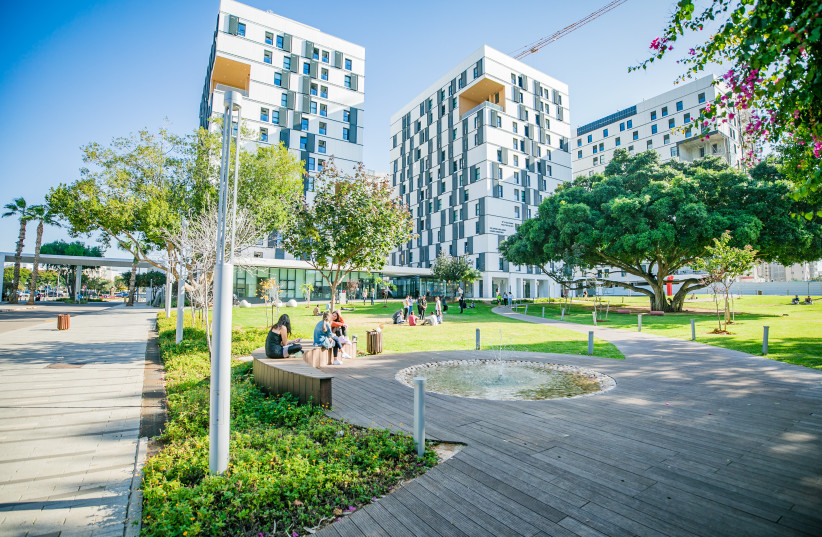For centuries Jews encountered problems and said “oy”; Zionists face problems and create joy. That’s because most people see empty spaces as bleak landscapes, while Zionists see them as opportunities to dream big and build bigger.
These eternal, still-relevant, Zionist insights hit me last week when I joined JNF’s World Zionist Village Stakeholders’ Mission in Beersheba. I’m not much of an institution guy – I don’t do budgets, politics or personnel. Beyond one ongoing commitment to Taglit-Birthright Israel’s International Education Committee, I hate meetings and avoid sitting on boards as zealously as Itamar Ben-Gvir dodges responsibility for today’s security problems. Still, occasionally a project intrigues me and I agree to help out in the brainstorming or evaluation.
That is why I ended up driving down to Beersheba last Monday, kicking myself for saying “yes.” Arriving at the edge of Beersheba’s River Park, I met the group at a lake. A lake in the desert! That was the first of many kicks to my Zionist adrenals. Then, JNF-USA’s CEO, Russell Robinson, explained that when JNF first made the lake – if “make” is the right verb – it attracted too many birds dropping, ahem, too many droppings.
An unapologetically Zionist community
In response, the JNF made a bird sanctuary. Voilà! Problem solved. Over the next 24 hours, I kept encountering this JNF way of thinking – you think green and blue-and-white; dream about a better future – then move heaven and earth to make it happen.
Within minutes of joining this impressive, idealistic group, I noticed a delightful conversational tic. They use the words “Zionist” and “Zionism” frequently, lovingly, proudly. Once again, I saw how our communal obsession – in Israel and abroad – with the minority of anti-Zionist “un-Jews” overlooks the silenced majority of American Jews who love Israel and are naturally, happily, unapologetically Zionist.

Even more inspiring than this former garbage dump turned oasis was our next stop. We stood on a hill overlooking an 8-hectare sandpit, with a small blue-and-white sign proclaiming “The World Zionist Village: The Conversation Starts Here.” Others would see only wasteland – near Beersheba’s Cinema City and its holiest consumer shrine, Ikea. I watched everyone stare lovingly at all that dirt and bramble, imagining classrooms, dormitories, hotels, adult study centers, a library filled with Zionist classics, a Zionist beit midrash – all state-of-the-art, eco-friendly and ideologically invigorating, buzzing with locals and tourists alike.
Honoring the past while building the future
In the education committee, we’re brainstorming about the programs, for young and old, for visitors and Beershebans, this campus will offer. But we’re also talking about how you make the place look and feel Zionist – beyond its obvious power in making a little more of the desert bloom.
I think, for example, of the amazing vibe of Reichman University in Herzliya. In the center, the restored buildings of the former army base it was, make it feel like a warm, intimate pre-1948 kibbutz – peppered with impressive archaeological artifacts from the Antiquities Authority. The modern buildings ringing the old base bring alive Theodor Herzl’s vision of Altneuland, old-new land.
I also think of the New York Yankees’ monument park. Instead of statues and plaques honoring Babe Ruth, Lou Gehrig, and other baseball greats – wouldn’t it be great to have plaques, monuments and art exhibits, indoors and outdoors, honoring great Zionist thinkers and great moments in Zionist history?
Balancing individualism and community
MY SHORT trip to Beersheba – and to this Zionist think-and-do tank of the future – got me thinking about Herzl, David Ben-Gurion and Cinderella. When I edited Herzl’s diaries, I noted that they functioned as the political science equivalent of an artist’s sketchbook. Day after day, Herzl woke up with a new idea about what the state would look like, how the Jewish-democratic state he envisioned would be ever closer to perfection and do ever more to boost both the Jewish people and the world. We forget just how many people all over the world and how many Israelis wake up every day just trying to make Israel and the world a better place.
Ben-Gurion was gruffer than Herzl, more of a Zionist builder than Jewish dreamer. People most remember Ben-Gurion’s passion for the Negev Desert, but he also had faith in Beersheba’s future. When a committee of experts concluded that this small desert town would never grow much larger than its population of 28,000, Ben-Gurion snapped: “Appoint a new committee.” Today, as many as 650,000 people live in this desert boomtown and its metropolitan area.
And more than Cinderella, I actually was thinking of her Fairy Godmother. In the Disney movie, the Fairy Godmother prances around singing “Sala-gadoola-menchicka-boo-la Bibbidi-bobbidi-boo,” as everything she touches with her magic wand transforms into something wonderful. Keren Kayemeth LeIsrael-Jewish National Fund has been doing that since Herzl pushed for its establishment at the Fifth Zionist Congress in 1901.
The modern world has created a centrifugal liberalism – spiraling ever outward toward more individualism, more license, more licentiousness, less community – triggering crises of loneliness, of disconnectedness, of meaninglessness and purposelessness. Zionism has always been just countercultural enough to offer an alternative.
Zionism’s old-new centripetal liberalism is still open, democratic, tolerant, individualistic. But it is also communitarian, traditional, family-oriented, meaning-making and soul-stretching. Not surprisingly, the inherent tensions within this forward-backward, inward-outward, Jewish-democratic mix sometimes bubble over. Still, equally predictably, they also produce happier Israelis, a more productive society and a stronger, prouder Jewish people, still building the Zionist dream by contributing what they can from all four corners of the earth, to this little hole in the Middle East – which has become a global treasure.
The writer is an American presidential historian and, most recently, the editor of the three-volume set Theodor Herzl: Zionist Writings, the inaugural publication of The Library of the Jewish People.
